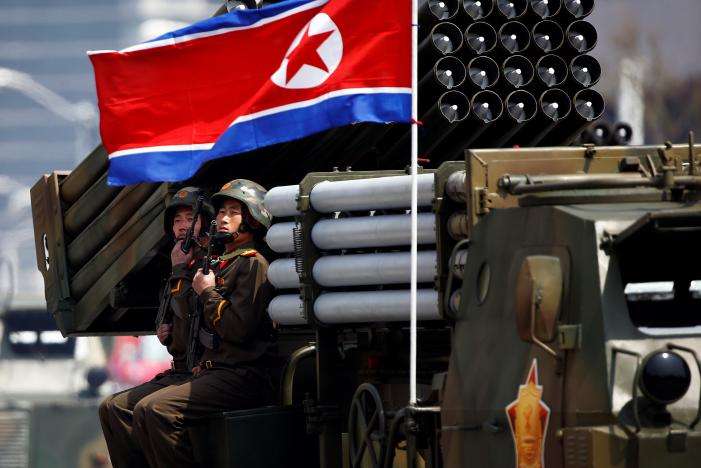
After insisting that China should “solve” the North Korea problem, President Donald Trump appears to have given up. “While I greatly appreciate the efforts of President Xi & China to help with North Korea, it has not worked out. At least I know China tried,” he tweeted. Now the issue apparently is back in President Trump’s not so capable hands.
Unfortunately, the administration really didn’t try. Beijing never was going to act just because President Trump wanted it to. Expecting the People’s Republic of China to destroy its ally while the U.S. was busy elsewhere in the region seeking to contain Chinese military power, and to do so without receiving anything in return, never was realistic. Unspecified trade concessions simply weren’t enough to make a deal. Washington had to offer far more.
Alas, the administration doesn’t have any other good options. Despite President Trump’s posturing with his promise to send an armada off of Korea’s coast, his officials later discounted the possibility of taking military action. Airstrikes might not reach all the facilities and probably would ignite a war, with devastating consequences to everyone involved, most dramatically South Korea.
Enhanced sanctions are more likely, including secondary sanctions against Chinese companies and banks. This would risk creating a confrontation with Beijing, which has always rejected unilateral penalties, especially against its nationals. By shifting the issue from North Korea to the PRC the Trump administration might actually increase Chinese support for the North. Witness the popular rage against South Korea over the THAAD deployment.
Moreover, though tougher sanctions would impose economic hardship, there is no reason to assume that alone would bring Pyongyang to heel. When I visited the Democratic People’s Republic of Korea in June, officials insisted they would stand firm against America’s “hostile policy” no matter what. Of course, they could be expected to say that. But the DPRK did not change policy even in the midst of horrific famine a couple decades ago.
And so far the PRC appears to value stability above all. If the Kim regime appeared in danger of breaking, Beijing might buttress the North rather than risk a collapse, and the violent chaos which could follow. Which likely would lead to U.S. retaliation against China.
None of this is in the PRC’s interest. Instead of acting as bystander if both regional stability and U.S. relations unravel, Beijing push Washington to engage in serious negotiation with all parties.
The U.S. is in no position to simply order the DPRK about. Indeed, America’s bellicosity and propensity for regime change have given the Kim dynasty a justification for building nuclear weapons. The North Koreans pointed to American military intervention elsewhere and told me that they intended to meet military force with military force. To change that Washington will have to make concessions too.
America’s priority should be halting Pyongyang’s advancing missile and nuclear programs. Living with a North Korean arsenal of 20 bombs would be unpalatable but not impossible. The DPRK with 100 nukes and the capability to hit any city in the U.S. would be quite different. The priority should be containing the threat.
Thus, Washington should revive the North’s proposal for a freeze on its activities in return for an end to annual military exercises between the U.S. and South Korea. The latter agitates North Korean officials, who call them a cover for possible attack. However, when I raised this possibility they dismissed it, saying that the U.S. had rejected their offer. Coming from China and America together, and backed by the threat of joint sanctions, it would be more persuasive.
With some breathing space, Washington could work with the Republic of Korea and Japan to develop a big offer in return for denuclearization, and Beijing to win the latter’s endorsement. The package would have to emphasize security—the DPRK’s rulers watched the war in Libya and aren’t impressed with verbal assurances like those offered by Secretary of State Rex Tillerson. Washington would have to take steps to end its “hostile policy,” in the North’s parlance.
China should offer its support, as well as whatever assistance and assurances would encourage Pyongyang’s acceptance. The objective is to denuclearize the peninsula peacefully through negotiation. All efforts should be directed at providing a positive option that contrasts favorably to the much more hostile approach if diplomacy is rejected.
In return, the PRC would agree to back the effort with the threat of enforcing its own and U.S. sanctions, so long as its other interests were respected. That would include allied assistance for China if the result was a DPRK collapse. There likely would be refugees to be cared for. There could be factional fighting. Beijing might believe military intervention was necessary to stabilize the country.
Moreover, the U.S. should offer assurances that reunification would not put Beijing at a geopolitical disadvantage: in particular, all American military forces should go home in the event of unification. Seoul should consider a declaration of military neutrality for a unified peninsula. The allies might find such offers distasteful, but the PRC cannot be expected to aid its own containment.
Even this approach has critics. Some aver the importance of regular maneuvers to combat effectiveness, but the ROK should be taking over ever more of the responsibility for its own defense. The South vastly outstrips the North on every other measure of power. Others fear the agreement would not be enforceable, but that would be an issue for any negotiated settlement. Finally, such an agreement would leave human rights at risk. However, a North Korea holding tightly to its nuclear weapons seems unlikely to relax political controls.
President Trump raised the potential of a China-U.S. deal over North Korea. Beijing shouldn’t let him drop the issue without trying to reach an agreement. The situation in the North is likely to worsen, while the opportunities to solve it peacefully are likely to shrink. Action is needed now.
China US Focus

